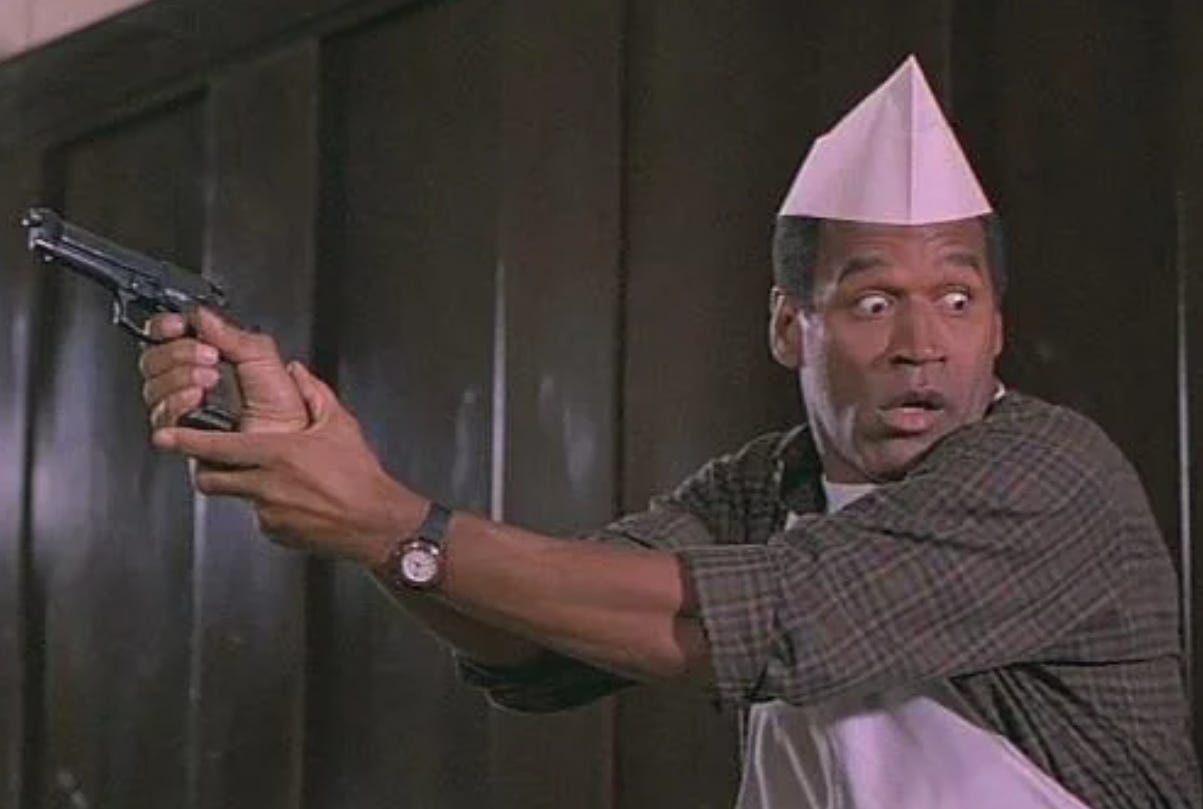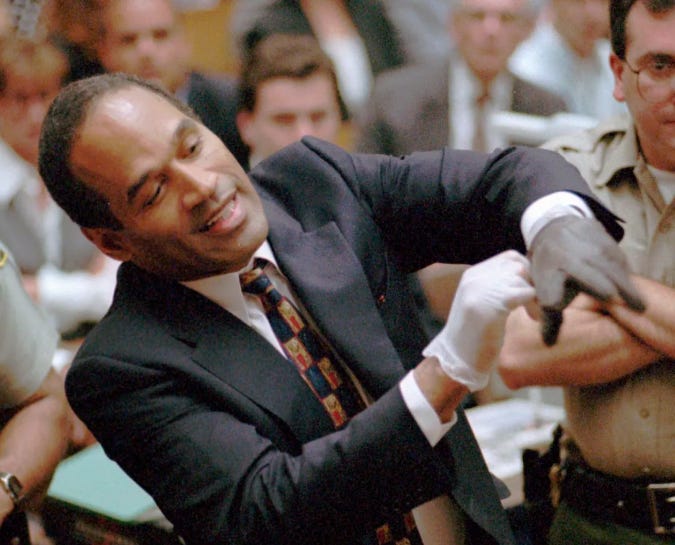I am currently in the market for a new piano for my living room and am happy to report that I just became aware of what looks like an incredible deal. The tricky part is that it involves an auction, the piano being part of the estate of its recently deceased owner. The seeming excellence of the deal is therefore riddled with uncertainty, as bidding closes in a matter of days. What should I do?
Did I mention that the recently deceased owner is O.J. Simpson?
According to reports, Orenthal James Simpson died of prostate cancer on April 10, 2024 at the age of 76. How many of you were even aware that O.J. Simpson was dead? Speaking for myself, I knew that he was dead, as in my brain remembers reading that he died, but there’s part of me that refuses to acknowledge this reality. To me, he’s dead like Michael Myers was dead at the end of the first Halloween movie. In my experience, people like O.J. Simpson do not just quietly go away, and I envision Donald Pleasence wandering around in the grass looking for O.J.’s body.
In other words, if I end up buying the piano, will O.J. come back to play it one day?
Let’s work through this together. I’m taking out the notepad, one side “PRO,” the other side “CON.”
On the PRO side, one must first lay the necessary foundation by acknowledging that O.J. Simpson was one of the greatest running backs in NFL history, a former Heisman Trophy winner, Hall of Famer, and the author of the first and greatest 2000-yard rushing season in league history. He went on to have a pretty decent acting career, where he starred in, most notably, The Naked Gun trilogy, playing the hapless and ill-fated Detective Norberg. Mr. Simpson’s later infamy can only be appreciated in the context of how his involvement in a gruesome double murder so sharply contrasted with his public image at that time. With that background out of the way, let’s get to the piano.
The current bid for the piano is only $3,500. This is not a dinky upright piano, but an impressive conservatory grand piano. A quality used version of a piano of this brand and caliber would normally run you at least five times that amount. O.J. Shmo-jay, that’s a steal. Contrary to what one would expect, this is not about paying a premium for an item because it was previously owned by an infamous person. That would be morbid. This is about whether it’s acceptable to purchase a quality item at a discounted price in spite of it being owned by that person.
As for the elephant in the room, the first CON on the ledger is the obvious fact that O.J. Simpson very likely committed a double murder. This is not a small consideration. However, whatever one might think about Mr. Simpson’s role in the homicides, there is no connection whatsoever between the piano itself and the murders. The piano, as far as I can remember, was not used to kill anyone. It’s not like O.J. lured the victims to a particular spot under the suspended piano and then cut the rope. No, he stabbed and slashed them repeatedly with a knife. The piano was, and has always been, blameless.
One would also suspect that the piano is in decent condition. How much piano playing has O.J. been doing over the years? Do we even know whether he plays the piano? If so, feel free to speculate on what songs O.J. liked to play. The list of menacing stalker songs is endless, from “Every Breath You Take” to the rare problematic Beatles song, “Run for Your Life,” to even the “March to the Scaffold” movement of Symphonie Fantastique, not to mention the moral abomination that is “Piano Man.” Plus, it must be extra difficult to play the piano while wearing those tiny blood-stained leather gloves.
Now is a good time to remind everyone of O.J. Simpson’s journey through the legal system after the grisly deaths of his ex-wife, Nicole Brown Simpson, and her unfortunate friend, Ronald Goldman, on June 12, 1994. Even though a jury of his peers found Mr. Simpson not guilty criminally in connection with these deaths, Mr. Simpson was not so fortunate in two later, much less publicized trials. These three cases comprise perhaps the most topsy-turvy trifecta of trials in the history of American jurisprudence.
First, in the highly publicized criminal trial, the so-called “Trial of the Century,” Mr. Simpson was acquitted of murder, walking free even though most everybody believed he committed the crimes as alleged, which were ghastly. Following the acquittal, the revelations of Simpson’s prior abuse, his newfound unmerited freedom, as well as his complete lack of shame or remorse for, well, anything, combined to make Simpson a pariah for the rest of his life.
Following the “not-guilty” verdict, the families of the victims filed a civil lawsuit against Mr. Simpson. In this civil case, Mr. Simpson was found liable for both deaths. Whereas a criminal case usually puts the freedom of the defendant on trial (hence the “beyond a reasonable doubt” standard of proof), a civil case puts the money, and only the money, of the defendant at stake. Wrongful death is not the same thing as criminal homicide. It is merely a tort, like not shoveling snow on the sidewalk in front of your house. The standard of proof is a “preponderance of the evidence,” which basically means “more likely than not,” so it is not logically inconsistent to have different verdicts based on the same set of facts. In this second trial, the families of the victims were able to satisfy this lower burden and won a judgment against O.J. Simpson in the amount of $33.5 million. That was in 1997. Today, the balance is currently hovering somewhere north of $110 million. This is but another teachable moment to our children about the virtues of compound interest.
Before getting to the third O.J. trial, we should now include another big PRO on the ledger in favor of buying the piano. This is because the money generated by the sale of the estate’s assets, including the piano, will most likely be used to pay off the debts of the estate. These debts would include the civil judgment Mr. Simpson was obligated to pay at the time of his death. In other words, buying this piano would help restore justice to the victims. It may therefore be a sin to not place a bid!
This leaves us with the third and final installment in O.J. Simpson’s remarkable and ignominious legal chronicle, which was perhaps the most bizarre, and not without its own arguable claim of injustice. In 2007, twelve years after his acquittal, Mr. Simpson learned that a sports memorabilia dealer in Las Vegas was selling items that personally belonged to Mr. Simpson. These included football photos and team jerseys worn by Mr. Simpson, and even the suit worn by Mr. Simpson during his first trial. In other words, these items were stolen. Mr. Simpson gathered together several associates to seek to retrieve these items. One of his cohorts brought a gun. The men burst into the supposed thief’s hotel room, threatened and cajoled, gathered the items, and left. For these acts, O.J. Simpson was tried, convicted, and sentenced… to 33 years in prison! This while all of Simpson’s associates, including the guy who brandished the gun, were literally set free.
Mr. Simpson ended up serving nine years in state prison for these crimes before he was eventually released on parole. The closest analogy I can come up with is from sports, which seems strangely appropriate. From time to time in football, the officials will completely botch a call at a critical moment, which mistake severely prejudices the team on the wrong side of the call. On the next possession, seeking to rectify their error and restore fairness, these same officials will often call a penalty against the other team, like a random holding penalty, whether or not there was any holding on the play. This is what is referred to as a “make-up call.” O.J.’s nine years spent in prison for literally getting his shit back is the real life equivalent of a make-up call. This probably deserves a deeper and more thorough analysis, but for purposes of the issue at hand, namely, whether I should buy the piano, it is relevant for several reasons.
The first is that O.J. Simpson did not get off completely scot-free for the double murders. We as a society generally acknowledge someone who has paid the price for his or her crimes and no longer carry the same resentment towards them upon their timely release from incarceration. With respect to O.J., to the extent any of that moral logic applies, his previous crimes may be at least partially expiated.
The other reason is more troubling, and it harkens back to the point made at the beginning. How sure are we that O.J. is actually dead? What if he’s still alive, roaming around somewhere with a new identity? What is the mortality rate for prostate cancer, anyway? What if he’s mostly dead, like in The Princess Bride? What if he’s a Highlander, a Michael Myers, a Freddy Krueger, a Jason Voorhees? This concern might seem outlandish, but, if there is even a remote possibility, there are two things that we do know about O.J. Simpson.
First, if you have his shit, he will try to get it back.
Second, he will probably murder you.
The bottom line is that there’s a lot to consider. This includes the fact that, if I do end up bidding and winning, I would still need to transport the piano from Las Vegas back to the East Coast where I live. On an unrelated note, do you think that grand piano would fit inside my 1993 White Ford Bronco?









No. Just no.
Some matters not on your list of considerations:
There's no reason to believe that the families of his murder victims will be beneficiaries of the sale of his possessions.
Yes, he will come back and haunt you. That's not speculative.
He nearly decapitated his ex-wife. How is that thought going to affect your rendition of 'Piano Man'?
Yes! And leave your kids with Michael Jackson